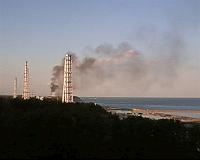 |
Tokyo (AFP) April 26, 2011 A survivor of the Chernobyl disaster says people exposed to radiation from Japan's crippled nuclear plant will spend the rest of their lives fearing the "bombshell" of cancer and other dire illnesses. Tuesday marks the 25th anniversary of the world's worst nuclear calamity and coincides with efforts to stop radiation seeping from the Fukushima plant after its cooling systems were knocked out by an earthquake and tsunami on March 11. "The Fukushima accident is like the twin brother of Chernobyl," said Pavel Vdovichenko, 59, who had already accepted an invitation from Japanese anti-nuclear groups to join a rally marking a quarter-century since Chernobyl. "People in the two places have to suffer long-time hardship," Vdovichenko, a Russian, told AFP through an interpreter. "People in Chernobyl suffered from cancer after the accident. A similar thing may happen to Fukushima." Waiting to see over the coming months and years if their health has been compromised is like living "with a bombshell waiting to explode" for people who lived close to the ageing Fukushima Daiichi plant, he said. Yet a generation after the disaster in Ukraine, then part of the Soviet Union, experts still disagree on the true extent of the effect on health, with estimates ranging from tens of thousands of fatal cancers to far fewer. There have been no deaths as a direct result of leaking radiation from the Fukushima facility in Japan's northeast, but the government has evacuated 85,000 people from homes nearby and set up an exclusion zone. The plant was rocked by a series of explosions and radiation has leaked into the air, ground and sea in the world's worst nuclear disaster since Chernobyl. Vdovichenko saw first-hand the long-term harm that Chernobyl had on local people. He lived -- and still lives -- in Bryansk, 180 kilometres (110 miles) from the plant and one of the areas worst affected by the 1986 catastrophe. "People suffered a collapse of the economy," said the former history teacher who founded "Radimichi for the Children of Chernobyl", a support group for the most vulnerable victims. "Companies went bankrupt. Agriculture has fallen apart. There is nowhere to work," he said. "People had no choice but to eat berries and animals from the woods and fish from the rivers and lakes, which were all contaminated." "Of course I have fears," he said of his decision not to flee the stricken area. "I have problems with my thyroid, but it is my hometown. I try not to think of my health." Vdovichenko said people who were resettled from the areas closest to Chernobyl faced discrimination from others who thought radiation was contagious. "People did not want to come close to people from the contaminated zone," he said, adding that students from the region were told to study at desks isolated from others in their classrooms. In Japan, the government has also urged people not to discriminate against the evacuees following reports that some hotels had turned people from the Fukushima area away and that children had been bullied. Japan has placed the disaster on the maximum seven on an international scale of atomic crises, the same level as Chernobyl, and the troubles at Fukushima have prompted many questions about whether atomic power is too great a risk. But while both incidents have the same rating, Japanese government officials have stressed that the total radiation released from Fukushima is around one-tenth of that from Chernobyl. Another difference is that the Fukushima accident was triggered by a natural disaster -- the 9.0-magnitude earthquake and tsunami that left more than 26,000 people dead or missing -- while Chernobyl was blamed more on human error. As Japan struggles to contain its disaster and Ukraine works on a giant shelter to secure Chernobyl's ruined reactor, Vdovichenko warned another nuclear crisis may occur elsewhere if lessons are not learned fast. "Some people in the world may say Chernobyl is over, but this is wrong," he said. "The Fukushima accident occurred after people failed to resolve Chernobyl. If people fail to resolve the two cases, a third one will come. "The victims of Chernobyl and those of Fukushima need to work together. We need to make an effort to make sure there are no more nuclear disasters like this."
Share This Article With Planet Earth
Related Links Bringing Order To A World Of Disasters A world of storm and tempest When the Earth Quakes
 Telling truth main lesson of Chernobyl, Fukushima: Medvedev
Telling truth main lesson of Chernobyl, Fukushima: MedvedevMoscow (AFP) April 25, 2011 The main lesson of Chernobyl and Fukushima is that authorities must tell the truth, Russian President Dmitry Medvedev said Monday ahead of the 25th anniversary of the world's worst nuclear disaster. Medvedev made the plea for transparency in nuclear emergencies at a meeting in the Kremlin with rescue workers who were charged with cleaning up Chernobyl and have long complained of being unawar ... read more |
|
| The content herein, unless otherwise known to be public domain, are Copyright 1995-2010 - SpaceDaily. AFP and UPI Wire Stories are copyright Agence France-Presse and United Press International. ESA Portal Reports are copyright European Space Agency. All NASA sourced material is public domain. Additional copyrights may apply in whole or part to other bona fide parties. Advertising does not imply endorsement,agreement or approval of any opinions, statements or information provided by SpaceDaily on any Web page published or hosted by SpaceDaily. Privacy Statement |